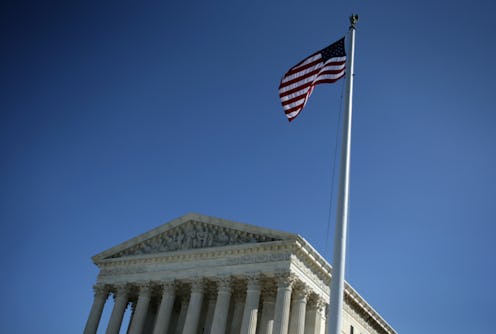News
Another Big SCOTUS Ruling Slipped Under The Radar
I know this may be a little hard to believe, but there are cases on SCOTUS' radar right now other than the ones dealing with the Affordable Care Act (ACA) and same-sex marriage. Thursday's belle of the ball was of course the ACA, which got people majorly pumped after the Court voted to uphold health care subsidies for millions of low-income insurance customers. But before that huge news hit, it was also announced that the Supreme Court voted to protect anti-housing discrimination laws — and that's a big effin' deal, too.
In the 5-4 decision, the Court backed the 1968 Fair Housing Act, which barred discrimination against the renting, leasing, or financing of housing based on race, religion, nationality, or sex. Before you get too alarmed, though, no one was actually trying to repeal it completely. But they were trying to take away one of the useful tools in combatting housing segregation — something that sadly remains an issue, nearly 50 years after the bill's passing. In fact, according to NPR, Attorney General Loretta Lynch reacted to the ruling by saying, "While our nation has made tremendous progress since the Fair Housing Act was passed in 1968, disparate impact claims remain an all-too-necessary mechanism for rooting out discrimination in housing and lending."
The act itself was resurrected over a little dispute in the state of Texas. As NPR reports, the Inclusive Communities Project (which is a non-profit focused on creating racially diverse communities in Dallas) claimed that the Texas Department of Housing and Community Affairs was inadvertently contributing to segregation. Specifically, the agency was supporting low-income housing projects with tax credits, but doing so mostly in high-poverty minority areas. This in turn denied low-income families the opportunity to seek housing in areas with better schools, more opportunities, and greater diversity.
So while Texas wasn't exactly telling minorities that they couldn't live in certain neighborhoods, state policies were creating segregated neighborhoods without explicitly nailing up a "WHITES ONLY" sign. This is where a little principle called known as "disparate impact" comes into play — when something isn't intended to be discriminatory, but ends up perpetuating the same problem anyway.
On Thursday, SCOTUS upheld the legality of disparate impact in housing discrimination, basically saying that any kind of discrimination (inadvertent or not) is illegal. Make no mistake, that's big news for millions across the U.S. — especially when you consider how incredibly difficult it is for low-income Americans to find affordable housing. According to Mother Jones, in 2013 researchers found that not one single U.S. county had enough affordable housing to accommodate the amount of "extremely low-income" households in their population. In fact, they didn't even have enough for those that make 30 percent of the county's median income. (What!) This news is especially troubling considering the number of extremely low-income households looking to rent property increased 38 percent between 2000 to 2013.
And consider this: The U.S. Department of Housing and Urban Development (HUD) has said that an estimated 12 million households either renting or buying are putting over 50 percent of their total income toward housing. That means additional living expenses like food, transportation, and clothing are pretty hard to come by. According to HUD, there's also nowhere in the United States where a family with one full-time worker earning minimum wage can afford even a two-bedroom apartment. (How's that for depressing?)
So yea... this SCOTUS victory, though not met with as much fanfare as the one for Obamacare, was just as big a win for millions of households across America. And that just gives us one more reason to celebrate.
Images: Getty Images (1)
